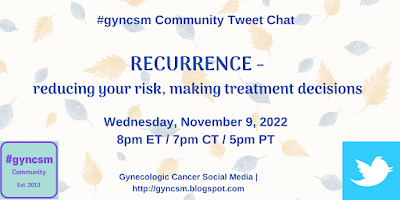We ended the year with a chat titled Looking Back, Looking Forward. During the chat we reflected on what we did in 2022 and looked ahead to 2023. Sample responses may be found below.
You may find a transcript here and analytics here.
T1: What are some things you did in 2022 that brought you satisfaction? What steps have improved your overall quality of life?
- Got back to doing some family traveling this year and really cherish this time as both of my kids are now teens.
- I got organized and I asked for help. That has helped tremendously! I've also made time for meditation and breathing exercises.
- Family, fur-kids, friends and lake time. Reminding myself to keep my self-care a priority.
- In 2022 we made a lot of progress with our free awareness poster program for Gynecologist we are now expanding to include Retirement Centers.
- I am learning that I must take care of me so that I'm healthy to take care of others.
- Our CCAM theme this year was "Take Care of You in 2022." Self-care is a crucial part of our work in the cancer advocacy space.
- I wish I could have done more fundraising we are deciding to stay located in Dallas and next year we plan on getting connected so we are able to get the funding we need to take care of our patients, survivors, and caregivers
- I wish I had taken more long walks with my dog in the local parks. And spent more time painting. Which makes me think I need to prioritize my time differently
- Giving myself permission to use my anxiety medication (before I’m already in an attack). Plans are for better sleep habits.
- It has been great to see all the global collaboration around #cervicalcancer and #ovariancancer. Also was pleased to see @ocrahope expand a bit beyond the ovary in its focus. And always love how @IamCervivor embraces all areas of gyn cancer and women's health.
- Patients are advocating for better treatment. More research is being conducted. Talking about gynecological cancer. We still have more work to do.
- I know we're beyond thankful to have been a part of the launch of the National Breast and Cervical Cancer Roundtables! Super grateful @tamikafelder was able to represent @IamCervivor and our community with the opening remarks for @FLOTUS
- I am seeing more focus on ovary preservation whenever possible and why it should be done. Hopefully that will become standard of care. Glad I was able to keep mine.
- I'd LOVE to see survivors continue to share their stories, for GYN cancer communities to join together to make a bigger impact, and for the patient voice to be included more.
- It's been my wish for 17 years now but I sure would love to see a detection test for ovarian cancer . I wonder if work on ctDNA might hold the key?
- I'd love to see continued collaboration across gyn cancer and cancer groups. I'd also love to see more programs on basic anatomy and health as a starting point entry to gyn cancer awareness.
- Providers to actively LISTEN to the patient and their concerns. Too many are so preoccupied that they don’t/won’t listen. Also, applies to insurance companies.
- I like that on Twitter there are so many varied groups that can pop in&out of discussions as there is interest. I also really appreciate the healthcare provider participation. Which on some patient community websites, those folks are not there - sometimes by design.
- I appreciate the researchers and gyn oncs who share the results of their studies or when they and other patient advocates tweet live from the oncology meetings they attend.
- I enjoy being able to connect with other survivors, physicians, nonprofits, etc. We cannot do this work alone and we are most certainly stronger together.
- Providers sharing knowledge. The sharing of support for gynecology oncology.
T6: What are your plans for staying or leaving Twitter? Which other platforms have you tried or are you considering? Any thoughts on the future of #gyncsm and what you'd like to see?
- Not sure I'm ready to start over anywhere. Heard about Hive and Post as things to maybe try. I belong to a patient community @smart_patients but it isn't the same as an open forum - different goals - and of course it isn't a place for awareness/education.
- Taking it day by day with
. Currently on FB, IG and TT.
- I love that we are all able to connect and help each other be great advocates!
Our current plan is to hold 6 chats in 2023, meeting every other 2nd Wednesday at 8pmET. Save the date for our next chat Wed, Jan 11, 2023 at 8pmET when we’ll discuss “Survivorship”. Hope to see you then.
Interested in what might come next for the #gyncsm community in a post-Twitter situation? Keep in touch by joining our email list: https://docs.google.com/forms/d/e/1FAIpQLSd6wIqLCEihexj93JcUPuqO5eZDH3j0VuLyniIEG2pZV657FQ/viewform
Dee and Christina







